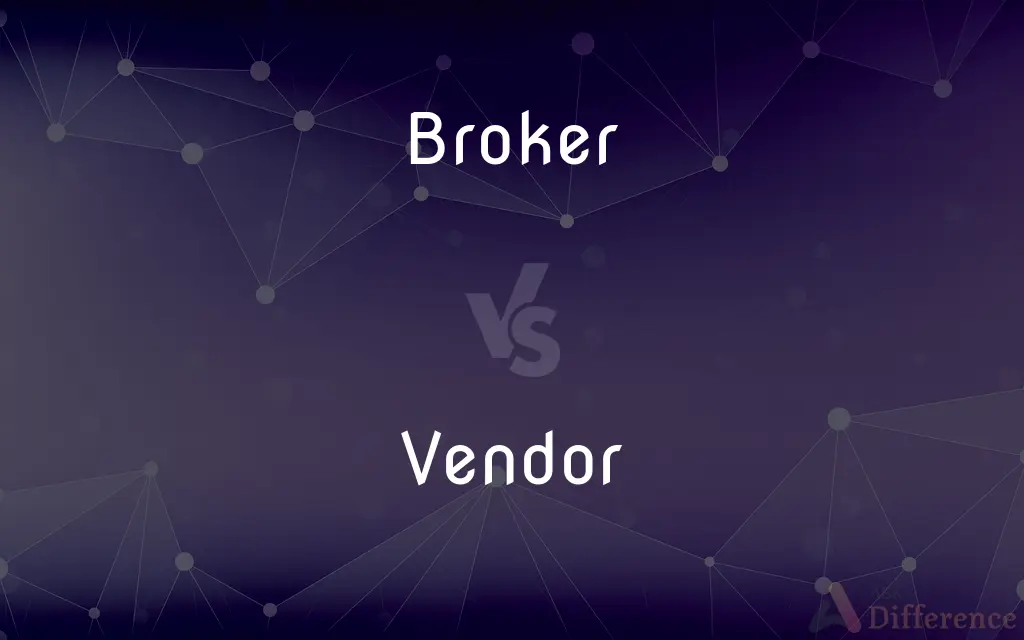Broker vs. Vendor — What's the Difference?
By Maham Liaqat & Fiza Rafique — Updated on March 12, 2024
A broker acts as an intermediary in transactions, facilitating deals between buyers and sellers, while a vendor sells goods or services directly.

Difference Between Broker and Vendor
Table of Contents
ADVERTISEMENT
Key Differences
Brokers specialize in bringing parties together for transactions, offering expertise and negotiation skills, without owning the goods or services traded. In contrast, vendors own the goods or services they sell, directly engaging in sales to consumers or businesses.
While brokers earn commissions or fees based on the transactions they facilitate, vendors generate revenue through the direct sale of their products or services. On the other hand, vendors profit from the markup on their goods or services.
The role of a broker varies by industry, dealing in real estate, finance, or commodities, providing specialized knowledge and services. Whereas vendors can be found in a wide range of industries, from retail to B2B sectors, focusing on the production and sale of specific goods or services.
Brokers require specific licenses and regulations depending on their field, ensuring trust and compliance in transactions. Conversely, vendors must adhere to regulations related to commerce, product safety, and consumer protection, specific to the goods or services they offer.
Comparison Chart
Role
Intermediary facilitating transactions
Direct seller of goods or services
ADVERTISEMENT
Ownership
Does not own goods or services traded
Owns the goods or services sold
Revenue Model
Earns commissions or fees
Generates revenue through direct sales
Industry
Varied, including real estate, finance, insurance
Wide range, from retail to B2B services
Regulations
Requires specific licenses and adherence to industry standards
Subject to commerce and consumer protection laws
Compare with Definitions
Broker
Brokers facilitate deals between buyers and sellers.
The broker arranged a meeting between the buyer and seller.
Vendor
Vendors sell goods or services directly to consumers.
The vendor at the market sold fresh produce.
Broker
Brokers typically earn through commissions.
The real estate broker received a commission after the house sale.
Vendor
Vendors profit from selling products at a markup.
The clothing vendor sourced items at wholesale prices and sold them at retail.
Broker
Brokers do not own the goods or services they deal in.
The stock broker executed trades without owning the stocks.
Vendor
Vendors own the products they sell.
The software vendor developed and sold its own applications.
Broker
Brokers are often required to have professional licenses.
The mortgage broker passed a licensing exam to operate legally.
Vendor
Vendors operate in various sectors, offering specific goods.
The food vendor specialized in gourmet sandwiches.
Broker
Brokers offer expertise in their specific field.
The insurance broker provided valuable advice on policy options.
Vendor
Vendors must comply with commerce and safety regulations.
The toy vendor ensured all products met safety standards.
Broker
A broker is a person or firm who arranges transactions between a buyer and a seller for a commission when the deal is executed. A broker who also acts as a seller or as a buyer becomes a principal party to the deal.
Vendor
In a supply chain, a vendor, or a seller, is an enterprise that contributes goods or services. Generally, a supply chain vendor manufactures inventory/stock items and sells them to the next link in the chain.
Broker
One that acts as an agent for others, as in negotiating contracts, purchases, or sales in return for a fee or commission.
Vendor
A person or company offering something for sale, especially a trader in the street
An Italian ice-cream vendor
Broker
A stockbroker.
Vendor
One that sells or vends something
A street vendor.
A vendor of software products on the Web.
Broker
A power broker.
Vendor
One that provides products or services to a business for a fee.
Broker
To arrange or manage as a broker
Broker an agreement among opposing factions.
Vendor
A vending machine.
Broker
A mediator between a buyer and seller.
Vendor
A person or a company that vends or sells.
Broker
A stockbroker.
Vendor
A vending machine.
Broker
A mediator in general, one who liaises between two or more parties to attempt to achieve an outcome of some kind.
Vendor
To bundle third-party dependencies with the source code for one's own program.
I distributed my application with a vendored copy of Perl so that it wouldn't use the system copies of Perl where it is installed.
Broker
(computing) An agent involved in the exchange of messages or transactions.
Vendor
As the software vendor, to bundle one's own, possibly modified version of dependencies with a standard program.
Strawberry Perl contains vendored copies of some CPAN modules, designed to allow them to run on Windows.
Broker
(intransitive) To act as a broker; to mediate in a sale or transaction.
Vendor
A vender; a seller; the correlative of vendee.
Broker
(transitive) To act as a broker in; to arrange or negotiate.
Vendor
Someone who promotes or exchanges goods or services for money
Broker
One who transacts business for another; an agent.
Broker
An agent employed to effect bargains and contracts, as a middleman or negotiator, between other persons, for a compensation commonly called brokerage. He takes no possession, as broker, of the subject matter of the negotiation. He generally contracts in the names of those who employ him, and not in his own.
Broker
A dealer in money, notes, bills of exchange, etc.
Broker
A dealer in secondhand goods.
Broker
A pimp or procurer.
Broker
A businessman who buys or sells for another in exchange for a commission
Broker
Act as a broker
Common Curiosities
Can a broker also be a vendor?
While brokers and vendors have distinct roles, in some contexts, an entity might act as both, depending on the business model and services offered.
What is a broker?
A broker is an intermediary who facilitates transactions between buyers and sellers, often earning a commission for their services.
How do vendors comply with regulations?
Vendors must adhere to regulations related to commerce, product safety, consumer protection, and industry-specific laws.
What does a vendor do?
A vendor directly sells goods or services to consumers or other businesses, owning the products they sell.
How do brokers and vendors generate income?
Brokers earn income through commissions or fees from facilitating transactions, while vendors generate income through the direct sale of their products or services.
What industries do brokers typically work in?
Brokers work in various industries, including real estate, finance, insurance, and commodities.
What are some examples of vendors?
Examples of vendors include retail store owners, food stall operators, and companies selling software or services directly to consumers.
Do brokers need to be licensed?
Yes, in many fields, brokers are required to hold specific licenses to operate legally and ensure trust and compliance.
What skills are important for a broker?
Important skills for a broker include negotiation, communication, industry knowledge, and analytical abilities.
What considerations should vendors keep in mind?
Vendors should focus on product quality, customer service, regulatory compliance, and effective marketing strategies.
Share Your Discovery

Previous Comparison
Humiliation vs. Mortification
Next Comparison
Indeterminate vs. UndeterminedAuthor Spotlight
Written by
Maham LiaqatCo-written by
Fiza RafiqueFiza Rafique is a skilled content writer at AskDifference.com, where she meticulously refines and enhances written pieces. Drawing from her vast editorial expertise, Fiza ensures clarity, accuracy, and precision in every article. Passionate about language, she continually seeks to elevate the quality of content for readers worldwide.
















































